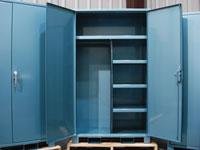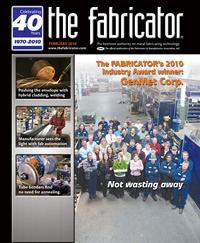Senior Editor
- FMA
- The Fabricator
- FABTECH
- Canadian Metalworking
Categories
- Additive Manufacturing
- Aluminum Welding
- Arc Welding
- Assembly and Joining
- Automation and Robotics
- Bending and Forming
- Consumables
- Cutting and Weld Prep
- Electric Vehicles
- En Español
- Finishing
- Hydroforming
- Laser Cutting
- Laser Welding
- Machining
- Manufacturing Software
- Materials Handling
- Metals/Materials
- Oxyfuel Cutting
- Plasma Cutting
- Power Tools
- Punching and Other Holemaking
- Roll Forming
- Safety
- Sawing
- Shearing
- Shop Management
- Testing and Measuring
- Tube and Pipe Fabrication
- Tube and Pipe Production
- Waterjet Cutting
Industry Directory
Webcasts
Podcasts
FAB 40
Advertise
Subscribe
Account Login
Search
Metal fabricator’s product launch proves profitable
Fabricator launches product lines during tough times
- By Tim Heston
- September 2, 2011
- Article
- Shop Management

A business doesn’t have to be glamorous to be profitable. For Zeus Metal Works, heavy-duty cabinets, a necessity in many industries, have opened the door (so to speak) to new opportunities.
Recently the staff at Olympic Steel’s Siler City, N.C., plant stumbled on a small problem and turned it into an opportunity—fast. It’s amazing what people can accomplish in a disastrous business climate.
Olympic Steel, like many others, experienced a rough ride in 2009. The public company issued quarterly reports with some significant sales declines from year-earlier results: 48 percent down in the first quarter, 66 percent down in the second quarter, and 63 percent in the third quarter.
The rapid descent came after several strong years. Olympic Steel has remained primarily a steel service center, but gradually the organization has brought in laser cutting and bending to provide value-added services for some customers. In 2006 the company made its first full-fledged leap into fabrication when it purchased Precision Steel & Welding, a contract fabrication shop in Siler City.
Business at that 80,000-square-foot North Carolina facility grew tremendously between 2006 and 2008, when the shop employed more than 300 and served such customers as Force Protection, Caterpillar, Volvo, and Ingersoll Rand. The Olympic fab shop specializes in heavy plate fabrication, producing, among other things, capsules for the mine-resistant, ambush-protected (MRAP) vehicle program. Things were going so well that the company rented space in Sumter, S.C., to handle overflow work; Olympic also bought land there with plans to build a new, 100,000-sq.-ft. facility.
Then 2009 happened.
“Our sales are tied to all these OEM customers, and we saw those sales go down, down, and down,” said Dan Shepard, general manager of Olympic Steel’s Carolina facilities.
The company halted its South Carolina expansion, though it continued to rent space in Sumter. Then the downsizing commenced. Today Shepard’s Carolina division employs 125. But through it all, the company continued its efficiency initiative, including 5S.
In fact, as part of 5S, employees stumbled onto a problem that led ultimately to a major company initiative. They couldn’t find cabinets they needed to hold heavy parts and tools, at least for the right price, so they fabricated their own. After using them on the floor, they thought of the possibilities: Could these be sold as a stand-alone product line?
They examined the competition and saw some shortcomings for those extreme, heavy-duty applications. Why weren’t shelf flanges deeper? Deeper flanges would increase strength. Why not increase the gauge? Shepard’s team found that increasing the gauge had only a slight impact on overall costs. The team also made the standards on each side one-piece, instead of two narrow pieces. One-piece standards prevent small loose items from falling between the shelf and side wall. Also, because more of the manufacturing world is adopting lean, these heavy cabinets likely would be moved around frequently. So the company designed fork truck safety pockets on the bottom so a fork truck or a hand pallet truck could move in easily underneath.
“Our largest cabinet weighs about 812 pounds,” Shepard said. “Each shelf has a 2,000-pound capacity. And holding 2,000 pounds, it has only about 2.3 mm of deflection over a 60-inch shelf.”
From this began an initiative that quickly gained support from top management at Olympic Steel. Because of the economic situation, the company didn’t dawdle. Shepard’s team developed the idea in August and pitched it to Olympic Steel management in September. In a matter of weeks, Olympic launched Zeus Metal Works and, with it, a new strategy for launching products. It even organized marketing efforts fast enough to exhibit at the FABTECH® Intl. & AWS Welding Show in November. And how’s this for management buy-in: Cleveland-based Olympic Steel moved its senior business review meeting to Chicago to coincide with the show, so they could be a part of the official Zeus Metal Works launch. (The name came from Olympic Steel’s NASDAQ ticker symbol, ZEUS.)
Shepard stressed that the cabinet was only the beginning. The company has instituted a formal product-launching initiative. “Anybody in the plant can give us the idea, and he or she can participate in the conversation.”
Employees first ask if the new concept competes with China. If Zeus can’t cost-effectively differentiate, the initiative stops. Like any stateside manufacturer, Zeus must compete on value and product differentiation, not on price alone. But if Zeus can compete with China by offering sufficient differentiation and value, the conversation continues. They look at what’s available on the market and how Zeus can make the product better with the available equipment on the floor. As of this writing, the company already is making gun safes as part of a private-label arrangement, and projects are in the works for other products, including specialty roll-off containers for trash disposal.
Zeus treads carefully, because it’s part of what remains primarily a metal service center operation, which operates more than 15 facilities across the country. Managers make sure that any new product Zeus makes does not compete with Olympic Steel’s contract fabricator or OEM customers. Contract work for Caterpillar, Deere, and others continues to flow through the shop floor alongside the Zeus product lines.
The initiative proves how valuable continuous improvement can be. At Olympic, expansion opportunities arose because employees looked inward.
The company’s lean 5S efforts, which had been ongoing for several years, led to discovering a need for heavy-duty, portable cabinets. If Olympic hadn’t bothered improving its own operations, it wouldn’t be where it is today.
The initiative also shows what makes contract metal fabrication, and manufacturing in general, unique among other businesses: It can retool to not only meet shifting customer demand, but also adapt to changing business models. Contract metal fabricators have the uncanny ability to discover products other metal fabricators might need for themselves. If a service firm, say, needs a new computer server, it can’t simply make one. But if a contract metal fabricator needs a product, like a specialized cabinet, that’s another story. It can design and fabricate one for itself, test it by simply using it for its own operations, and then develop a marketing strategy.
Talk about taking control of your own destiny.
About the Author

Tim Heston
2135 Point Blvd
Elgin, IL 60123
815-381-1314
Tim Heston, The Fabricator's senior editor, has covered the metal fabrication industry since 1998, starting his career at the American Welding Society's Welding Journal. Since then he has covered the full range of metal fabrication processes, from stamping, bending, and cutting to grinding and polishing. He joined The Fabricator's staff in October 2007.
subscribe now

The Fabricator is North America's leading magazine for the metal forming and fabricating industry. The magazine delivers the news, technical articles, and case histories that enable fabricators to do their jobs more efficiently. The Fabricator has served the industry since 1970.
start your free subscription- Stay connected from anywhere

Easily access valuable industry resources now with full access to the digital edition of The Fabricator.

Easily access valuable industry resources now with full access to the digital edition of The Welder.

Easily access valuable industry resources now with full access to the digital edition of The Tube and Pipe Journal.
- Podcasting
- Podcast:
- The Fabricator Podcast
- Published:
- 04/16/2024
- Running Time:
- 63:29
In this episode of The Fabricator Podcast, Caleb Chamberlain, co-founder and CEO of OSH Cut, discusses his company’s...
- Industry Events
16th Annual Safety Conference
- April 30 - May 1, 2024
- Elgin,
Pipe and Tube Conference
- May 21 - 22, 2024
- Omaha, NE
World-Class Roll Forming Workshop
- June 5 - 6, 2024
- Louisville, KY
Advanced Laser Application Workshop
- June 25 - 27, 2024
- Novi, MI































